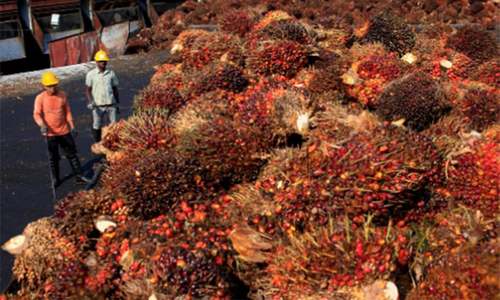India's halt on Malaysian palm oil imports has disrupted global edible oil trade flows, with Indonesia diverting supplies to feed India, Malaysia rushing to tap markets left behind by Jakarta, and India substituting palm with other oils.
India, the top global palm oil buyer, imposed restrictions on imports of refined palm oil last month, a move sources said was retaliation against Malaysia's criticism of New Delhi's actions in occupied Kashmir and a controversial citizenship law. Traders had also held off buying crude palm oil from Malaysia.
Malaysia's latest palm export data revealed the impact of India's restrictions, with shipments to India in January falling 85 per cent from a year earlier to 46,876 tonnes, the lowest since 2011.
India accounted for nearly a quarter of Malaysia's total palm oil exports last year and has been the biggest buyer of Malaysian palm oil for five years.
To compensate, Malaysia dialled up shipments to other destinations, with exports to Pakistan, Saudi Arabia and Ghana — markets that have traditionally bought heavily from Indonesia — all increasing in January by more than 100pc from the same month in 2019.
"A rebalancing is happening in the palm oil market," said a Mumbai-based dealer with a global trading firm.
"European and price-sensitive Asian buyers are switching to Malaysia from Indonesia due to lower prices."
Indonesian prices have climbed to a rare premium to Malaysian levels this year, on expectations of higher Indian purchases.
Lee Yeow Chor, chairman of state agency and industry body the Malaysian Palm Oil Council (MPOC), said lower stockpiles in Malaysia have so far cushioned producers from the full impact of India's drop off.
"Right now, the situation for Malaysia is not critical. We are still tight on stocks [...] (India) may buy more from Indonesia. But that will open up a vacuum somewhere in the market elsewhere," Lee said. Malaysian stockpiles are at a two-year low.
Lee said Malaysia was looking to expand market share in the Middle East, Africa and Southeast Asia.
Data from the Malaysia Palm Oil Board shows Malaysia sold 170,802 tonnes of palm oil to Pakistan last month compared to 80,660 tonnes a year earlier. It also sold 12,527 tonnes to Bangladesh, up from 575 tonnes the year before. Indonesia was the biggest supplier to these markets last year.
India shifting from palm
Benchmark palm oil prices rose by 60pc from July to December last year, though they have fallen recently on concerns over Indian demand and the coronavirus outbreak in China.
India, a price-sensitive market, had slowed palm purchases in the last three months because of the rising prices.
A narrowing spread between the price of palm oil and that of other oils has also encouraged substitution. India's imports of palm oil in January fell 27pc from a year ago to 594,804 tonnes, while soy oil and sunflower oil imports jumped 40pc and 51pc, respectively, data from the Solvent Extractors' Association of India (SEA) showed.
That pushed palm oil's share in India's edible oil import basket to 51pc in January, the lowest since June 2018.
B.V. Mehta, executive director of the SEA, said Indonesian suppliers could lower prices to retain buyers or India would continue to buy more rival oils.
"It can't charge a hefty premium consistently over Malaysian supplies. Whenever a gap between palm oil and soft oils narrows, Indian buyers shift to soft oils," he said.















































